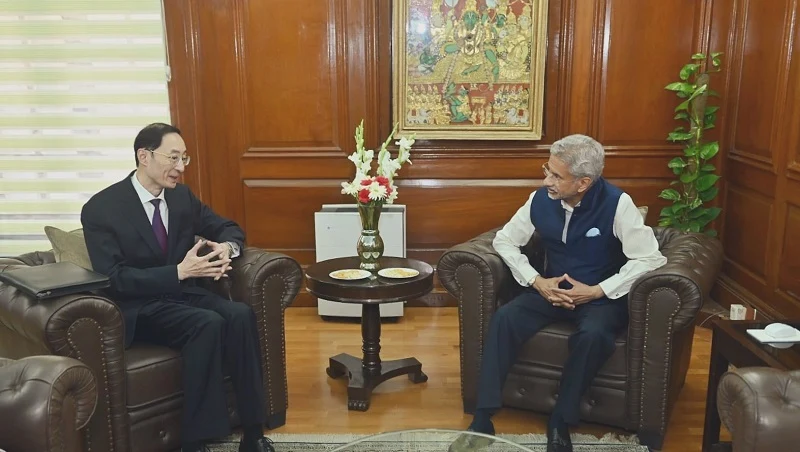

External Affairs Minister S Jaishankar with outgoing Chinese Ambassador Sun Weidong in New Delhi on Wednesday (Image courtesy: Twitter/@DrSJaishankar)
India has once again emphasised to China that the development of relations between the two countries will continue to be guided by the three mutuals – mutual respect, mutual sensitivity, and mutual interests – with peace and tranquillity at the border areas being a determining factor.
External Affairs Minister S Jaishankar conveyed the message to outgoing Chinese Ambassador Sun Weidong who paid a farewell call to him in New Delhi today.
It is not the first time that Jaishankar has indulged in some plain-speak on the matter. Even as discussions on disengagement at the Line of Actual Control (LAC) continue, India has made it clear to China that any expectation that life can carry on undisturbed despite the situation at the border is simply not realistic.
Sun was appointed as the Ambassador of China to India in July 2019 – nearly a year before the faceoff at Galwan Valley in June 2020.
Immediately after the incident, the Ambassador had accused Indian troops of crossing the disputed border and remarked that the “onus is not on China”, causing furore and putting the bilateral relationship under further stress.
However, in his farewell speech on Tuesday, the Chinese Ambassador reflected on the longstanding historical and cultural ties between ancient oriental civilizations adjacent to each other for thousands of years.
In a significant climbdown, Sun said that both countries should realise that their common interests outweigh their differences and should strive to resolve it through dialogue and consultation.
“We should respect each other’s chosen political system and development path, and adhere to the principle of non-interference in internal affairs,” said the Chinese diplomat.
Sun hoped that, “under the strategic guidance of the leaders of the two countries” and the joint efforts of both sides, the India-China bilateral relations will eventually clear the clouds and return to the right track.
“It can be said that in the 2,000-year history of exchanges between China and India, friendly times have accounted for the vast majority,” he said.
Citing adherence to the “important consensus” reached by Chinese President Xi Jinping and Prime Minister Narendra Modi, Sun mentioned that China and India are not competitors but partners which do not pose a threat to each other and should realise that the “dance of dragon and elephant” is the only correct choice for them.
While India has welcomed the recent disengagement at Patrolling Point 15 in the Gogra-Hot Springs area along the LAC, it has maintained that China disturbing the peace and tranquillity in border areas will impact the relations.
“Our relationship is not normal, it cannot be normal as the border situation is not normal,” Jaishankar had said on the issue in August.
Much before Sun’s reflections on Tuesday, the EAM had summed up “eight broad propositions” to stabilizing the India-China relationship while addressing the All India Conference of China Studies, last year.
First and foremost, he said, was that agreements already reached must be adhered to in their entirety, both in letter and spirit.
Second, the LAC must be strictly observed and respected with any attempt to unilaterally change the status quo being completely unacceptable.
Third, he mentioned, that peace and tranquillity in the border areas is the basis for the development of relations in other domains. If they are disturbed, so inevitably will the rest of the relationship.
Fourth, Jaishankar said, while both nations are committed to a multipolar world, there should be a recognition that a multi-polar Asia is one of its essential constituents.
Fifth, he said that relationships between major states are reciprocal in nature even as each state will have its own interests, concerns and priorities but sensitivity to them cannot be one-sided.
Sixth, as rising powers, each will have their own set of aspirations and their pursuit too cannot be ignored.
Seventh, there will always be divergences and differences but their management is essential to bilateral ties.
And eighth, Jaishankar stated, civilizational states like India and China must always take the long view.
Also Read: Will delivery of Brahmos missiles help Philippines deter China in the Pacific?
NATO's recent decision to ramp up military spending will not significantly impact Russia's security, Foreign…
India has imposed anti-dumping duties on imports of Plastic Processing Machines from China and Taiwan,…
The Human Rights Desk of the Department of Information and International Relations for the Central…
India's trade delegation is currently in the United States for high-stakes negotiations aimed at finalising…
Defence Minister Rajnath Singh held a meeting with his Russian counterpart Andrey Belousov on the…
Hailing the all-party delegation which travelled to 33 different countries as part of India's global…